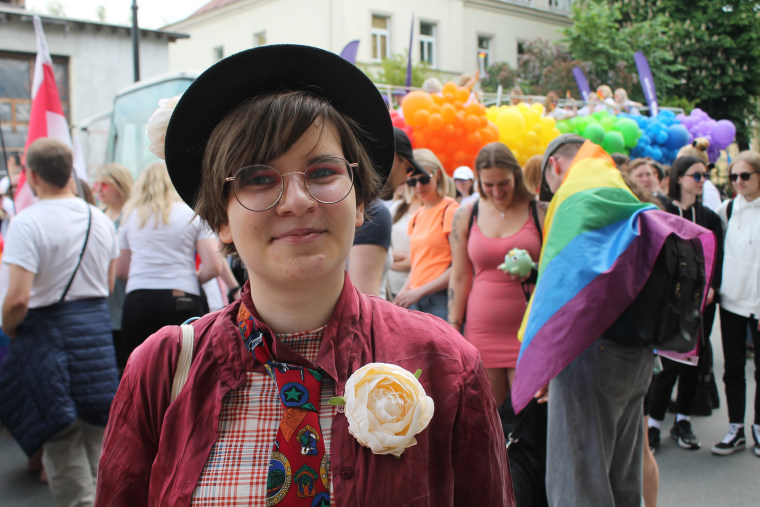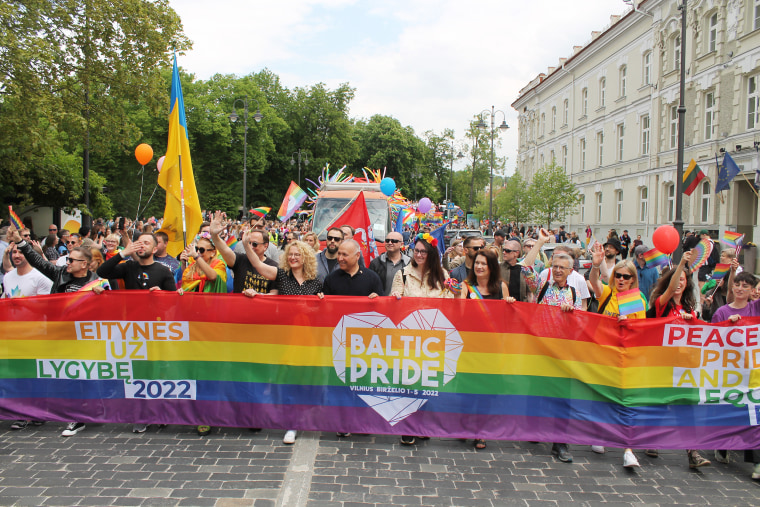pride ain't denied issue 1
In all the issues of this book, pride ain't denied, it shows the first 2 chapters a story written by me based on LGBTQ, then in the rest of the book there will be pride book recommendations, the latest pride based news, and a little pronoun education in the epilogue. The story in the first 2 chapters will be carried on through out the issues of pride ain't denied.
Last Updated
06/06/22
Chapters
6
Reads
646
Latest news on LGBTQ part #2
Chapter 4
In Russia's shadow, people have been fighting for LGBTQ rights:
Surrounded by thousands of people wearing rainbow flags, glitter and sparkly outfits, Eddie Balčiūnaitė prepared to take part in one of the biggest marches the Baltic countries have ever seen.
The 21-year-old nonbinary Lithuanian grew up in a country that since 2009 has banned sharing information that “expresses contempt for family values (or) encourages … entry into a marriage and creation of a family other than stipulated in the Constitution.” Dubbed the “gay propaganda” law by its critics, the ban even preceded Russia’s 2013 infamous legislation.
“The first time I heard about queer people was in the church, so it wasn’t a very positive portrayal, as you can imagine,” Balčiūnaitė, who uses he/she/they pronouns, told NBC News. “You Google stuff, you talk to your friends, and hopefully you learn something about yourself — but not with the help of the school or your teacher.”

Around 10,000 people, mostly young adults, flocked to the capital, Vilnius, from across Lithuania — a country of 2.8 million and the biggest Baltic country — and its neighbors Latvia and Estonia to join the annual Baltic Pride march Saturday.
“This is incredible,” said Juan Miguel, a Spaniard who studied abroad in Lithuania and arranged a reunion with his friends who are now spread across the continent. “Nine years ago, there were neo-Nazis at both sides and more police than participants.”
Since 2009, the annual event has rotated among the capitals of the three countries, gathering local activists and international allies. Vilnius hosted Baltic Pride for the first time in 2010. Back then, only 400 people marched.
“It wasn’t easy. People looked at us like they were in a zoo,” said Vladimir Simonko, executive director of LGL, Lithuania’s biggest LGBTQ group. “Our community is very brave to show up, and we have lots of allies that march with us.”
Big companies such as Google, Moody’s and the Nordic-Baltic bank Swedbank were among the participants and sponsors of this year’s march, as well as the embassies of countries such as the United States, Canada and Norway. The parents of Matthew Shepard, the American student brutally killed in Wyoming in 1998, also attended.
Under Soviet occupation from 1944 until 1991, Lithuania, Latvia and Estonia all joined the European Union in 2004, together with other countries of the Eastern bloc, including Poland and Hungary. But unlike their Nordic neighbors — only a short plane trip away — their human rights records lag behind, particularly when it comes to sexual minorities.
In the E.U., only Poland, Romania and Bulgaria rank worse than Lithuania and Latvia for LGBTQ rights, according to the LGBTQ advocacy group ILGA-Europe. And Estonia, an economic success story in the region for its impressive digital transition, remains in the lower half of the ranking in legal protections for queer people. Estonia is, for example, the only Baltic country that has so far introduced civil unions for same-sex couples.
Yet, things are slowly changing. Both the Lithuanian and the Latvian parliaments are currently debating similar bills that would introduce civil partnerships for same-sex couples, granting them some — but not all — the rights of marriage.
“We didn’t pay enough attention to human rights in Lithuania before,” said Jurgita Sejonienė, a conservative member of parliament and sponsor of the bill. “We arrive too late with this legislation. They’re people; they deserve the same rights as everyone else”.
After several failed attempts and the bill being watered down — avoiding the term “family” in its wording, for example — she hopes to secure a parliamentary majority in favor of the measure in the next weeks or months. But same-sex marriage is still years away, she said: “When people realize that civil unions don’t affect them in any way, we will change the public opinion step by step. This could be the way of success in Lithuania.”
Tomas Raskevičius, Lithuania’s only openly gay member of parliament, said reluctance to grant LGBTQ people further legal recognition comes mostly from the deep influence of the Catholic Church, as well as the legacy of Soviet occupation. The USSR made same-sex relations a crime in 1933, and it wasn’t until 1993 that Lithuania, already an independent country, decriminalized homosexuality. Latvia and Estonia had done so a year earlier.
Raskevičius was a lawyer and LGBTQ activist who went into politics to create “systemic change,” he said as he prepared to meet a group of young Lithuanians at the parliament and listen to their concerns. He said he will vote for the civil union bill in the hope that it will help ignite more substantive change in the long term.
“I’m not happy with the bill, because it’s full of compromises,” he noted. “The reality of politics is tough. This is just the first step on the road toward equality.”
Latvia could take a similar step in the next days or weeks, with its civil union bill only a vote away from being approved, providing the president doesn’t veto it.
“Until now, politicians didn’t care about this, but things have been changing in the past couple of years,” said Kaspars Zālītis, board member at the Latvian LGBTQ group Mozaika. “We went over a long way for the recognition of families outside the concept of marriage.”

Latvia is, however, the only country that still requires transgender people seeking to legally change their gender to undergo mandatory sterilization, according to the advocacy group Transgender Europe. In 2017, the European Court of Human Rights determined that a sterilization requirement breaches trans people’s right to bodily integrity.
“The wording of the law isn’t very clear, because it speaks about a permanent or semipermanent sex change, so some trans people can find their way around it,” Latvian activist Ana Metra said as she marched along the rainbow parade across Vilnius. “Trans issues are not even part of the public discussion, unlike same-sex civil unions. It feels like trans people have to wait in line until their turn comes.”
That trans rights aren’t even on the table is a view shared by activists across the region. Since 2002, Estonia has allowed trans people to change their legal gender without undergoing sex-reassignment surgery, sterilization or divorcing their partners.
“But if you want to change your legal gender marker, you have to start taking hormones and prove your gender identity to a medical committee,” said Anette Mäletjärv, an activist at the Estonian LGBT Association. Even though the Estonian language’s gender neutrality keeps people from having to come out in many situations — a bigger concern, for example, for many nonbinary Lithuanians, whose language is highly gendered — Mäletjärv said “people still don’t understand.”
In Europe, only a handful of countries, such as Iceland, Malta and Germany, have introduced some sort of nonbinary gender recognition.
“Many of the laws taken in the early years were influenced by the wish to enter the European Union in 2004,” Mäletjärv said. “But now we’re in a sort of pause; there doesn’t seem to be much movement.”
Yet, judging by the growing number of participants taking part in Pride events across the Baltics, civil society, particularly those in younger generations, seems to be slowly embracing LGBTQ rights.
“We are the first generation that did not grow up under Soviet occupation. We grew up in the European Union. We are free to do as we wish. It’s going to get better,” Balčiūnaitė said Saturday as the Pride march speakers on the floats played global queer anthems from Katy Perry’s “I Kissed a Girl” to Gloria Gaynor’s legendary “I Will Survive.”
Russia-Ukraine war looms large
At this year’s Baltic Pride march, there was an additional flag next to the sea of colorful Pride symbols that flooded Vilnius. Protesters from all over the region brought Ukrainian flags and banners calling for an end to Russia’s invasion of its neighbor.
“We’re not surprised about what’s going on in Ukraine. Everybody understood that it was a question of time,” Lithuanian activist Simonko said.



